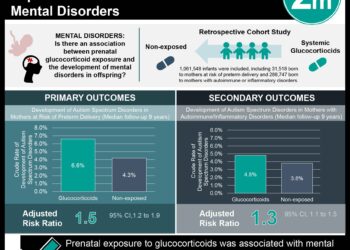Postpartum depression screening at well-child checks improves maternal mental health
1. Mothers who received postpartum depression screenings and treatment referrals as necessary at well-child checks at 1, 3, and 6 months were significantly less likely to be depressed at 9 months when compared to those receiving care as usual (CAU).
2. A number of secondary outcomes, including maternal anxiety, parenting, and mental health functioning, were also improved in mothers who received the screening intervention.
Study Rundown: Though postpartum depression is a well-documented complication after childbirth, symptoms often go undetected and unaddressed. In this study, mothers at pediatric primary care clinics were designated to receive screening interventions at 1, 3, and 6 months or CAU based upon the location of their well-child care clinic. Mothers who tested positive on screening also received information about treatment and referrals when necessary. The primary outcome assessed was maternal depression at 9 months postpartum. Secondary outcomes assessed included maternal anxiety, quality of life, parenting ability, and child social and emotional development at 12 months postpartum. Mothers receiving the intervention were less likely to have depression at 9 months and also demonstrated better maternal secondary outcomes at 12 months. There was no notable improvement in child socioemotional development. While the study intervention is relatively easy to administer, it would require adding another component to the already multifaceted well-child check. Researchers notes the results of their study should encourage wider use of postpartum depression screening and intervention, given its efficacy in improving maternal health.
Click here to read the study published today in Pediatrics
Relevant Reading: Do pediatricians recognize mothers with depressive symptoms?
In-Depth [prospective quasiexperimental comparative study]: This study assessed 3089 mothers identified from over 40 primary care centers. Mothers were assigned to either undergo postpartum depression screening (intervention group) or receive CAU (n = 1843 in the intervention group, n = 1246 in the CAU group). The intervention group underwent screening during well-child checks using the Edinburgh Postnatal Depression Scale (EPDS) at 1, 3, and 6 months. Those mothers with results concerning for depression on the EPDS received guideline-based instruction about finding support from either a family physician or mental health professional. Both groups – intervention and CAU – were assessed at 9 and 12 months postpartum using both the EPDS to evaluate depressive symptoms as well as various other screenings tools to assess the secondary outcomes (maternal anxiety, health-based quality of life, quality of parenting, and child socioemotional development). Mothers receiving screening and treatment intervention were significantly less likely to screen positive for depression at 9 months (OR 0.28 for major depression, 95%CI 0.12 to 0.63; OR 0.40 for both major and minor depression, 95%CI 0.27 to 0.58). Mothers receiving intervention also demonstrated improved secondary outcomes, including decreased anxiety, improved quality of parenting, and improved overall mental health (effect size ranging from 0.23 to 0.27). There was a negligible difference between the groups in regards to child socioemotional outcomes.
Image: CC/Wiki/AndresNietoPorras
©2017 2 Minute Medicine, Inc. All rights reserved. No works may be reproduced without expressed written consent from 2 Minute Medicine, Inc. Inquire about licensing here. No article should be construed as medical advice and is not intended as such by the authors or by 2 Minute Medicine, Inc.







